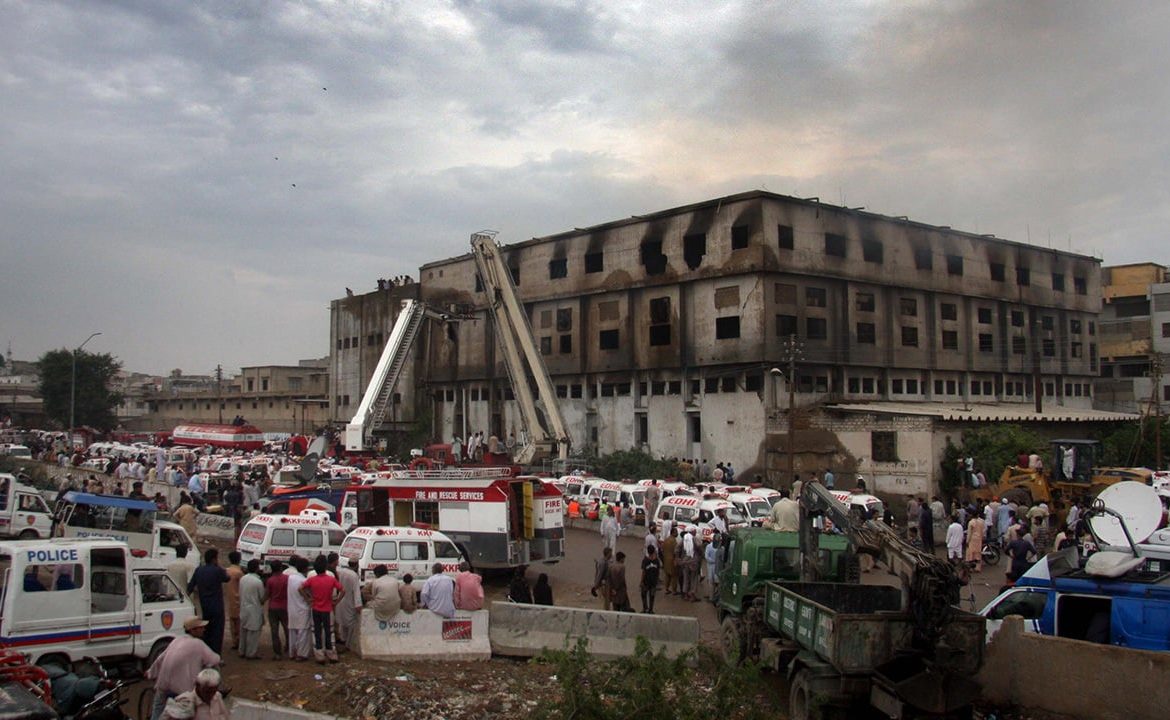Published in Dawn, October 03, 2021
The Constitution of Pakistan guarantees rights to workers against exploitation and discrimination, and safeguards their rights, dignity and honour in quite an adequate and well-defined manner. And, thus, Article 11 of the Constitution prohibits all forms of forced labour and traffic in human beings. The Article further provides that no child below the age of 14 years shall be engaged in any factory or mine or any other hazardous employment.
Article 17 ordains that every citizen shall have the right to form associations or unions, subject only to any reasonable restrictions imposed by law in the interest of the sovereignty or integrity of Pakistan, public order or morality. Article 18 prescribes that every citizen shall have the right to enter upon any lawful profession or occupation and to conduct any lawful trade or business. Article 25 prescribes that all citizens are equal before the law and are entitled to equal protection of the law and that there shall be no discrimination on the basis of sex alone.
Article 27 mandates that no citizen otherwise qualified for appointment in the service of Pakistan shall be discriminated against in respect of any such appointment, on the grounds only of race, religion, caste, sex, residence or place of birth. Article 37(e) enshrines that the state shall make provision for securing just and humane conditions of work, ensuring that children and women are not employed in vocations unsuited to their age or sex. It also provides for maternity benefits for women in employment.
And under Article 38, the state is obligated to secure the well-being of the people, irrespective of sex, caste, creed or race, by ensuring equitable adjustment of rights between employers and employees, and to provide social security for all persons employed in the service of Pakistan or otherwise, through compulsory social insurance or other means.
Pakistan has a good number of labour rights laws. Since 2010, provincial legislatures have been tasked solely with developing legislation governing labour laws within their provinces. The federal legislature can pass labour laws governing factories and businesses that have branches spread across more than one province, locally known as “trans-provincial” businesses.
At the federal level, the laws include the Factories Act, 1934; the Industrial Relations Act, 2012; the Industrial and Commercial Employment (Standing Orders) Ordinance 1968; the Workman Compensation Act, 1923; the Payment of Wages Act, 1936; and the Employees’ Social Security Ordinance, 1965. These federal laws apply, unless they are superseded by provincial legislation.
For example, Sindh’s many provincial laws replace the federal laws, including the Sindh Factories Act, 2015, the Sindh Terms of Employment (Standing Orders) Act, 2015, and the Sindh Industrial Relations Act, 2013. Similarly, in Punjab, the Punjab Industrial Relations Act, 2010, for example, replaces its respective federal counterparts.
However, due to weak and slack enforcement, Pakistan’s various labour laws and regulations have failed to adequately protect the workers’ constitutional safeguards. The constitutional safeguards also have not been of avail. And the workers in Pakistan, despite domestic laws and international labour rights standards, are often exposed to exploitation, and are subject to a range of labour abuses.
OCCUPATIONAL SAFETY AND HEALTH
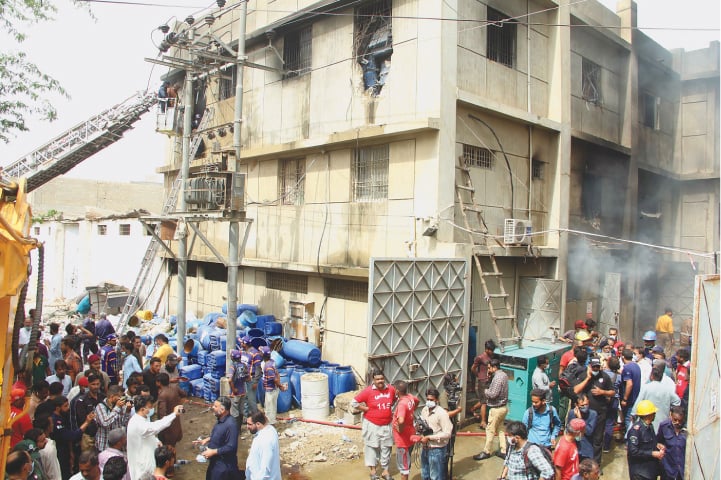
People gather around a factory in Korangi where a fire broke out on August 27, 2021 | Shakil Adil/White Star
As regards the Occupational Safety and Health (OSH), the following legislation exists in Pakistan: Dock Labourers Act, 1934, Factories Act, 1934, Mines Act, 1923 and Workmen’s Compensation Act, 1923. These laws mainly cover the formal sector manufacturing industry. The Factories Act, 1934, the main law containing OSH provisions, is applicable to manufacturing enterprises employing 10 or more workers. In addition, the Mines Act, 1923, covers the mining sectors. Other sectors are either not covered under OSH or the coverage is very limited.
However, as regards the September 12, 2012, Ali Enterprises garment factory fire, which occurred in the largest designated industrial area or special economic zone of Karachi called SITE — killing at least 255 workers and injuring more than 100 — three separate investigations by the police and the Federal Investigation Agency (FIA) found a series of irregularities and almost a complete absence of fire and safety mechanisms.
There were no escape routes, firefighting equipment or fire alarms, and the staff had no basic fire and safety training. Investigations concluded that the exit doors were locked from the outside by the factory management. And an illegal wooden mezzanine floor contributed to the rapid spread of the fire.
Investigations found that the factory was not registered with the Labour Department and, therefore, had never been inspected by the government. The Sindh Building Control Authority, the government body responsible for enforcing the building regulations, claimed to have no jurisdiction over the factories in the SITE area.
This deadly fire highlighted serious defects in the auditing and certification process. The Social Accountability 8000 programme (SA-8000) certificate was issued to the factory by RINA Services S.p.A, an Italian inspection company. The SA-8000 is a widely accepted certification standard that measures social performance in key areas, to hold organisations accountable in fair treatment of workers across industries and geographical regions.
The SA-8000 certificate to Ali Enterprise was issued on August 21, just 22 days before the fire and certified that the factory complied with all the necessary fire and safety mechanisms and labour laws. Subsequent investigation by Social Accountability International found that no inspection had taken place and the certificate was false.
LEARNING FROM PAST MISTAKES
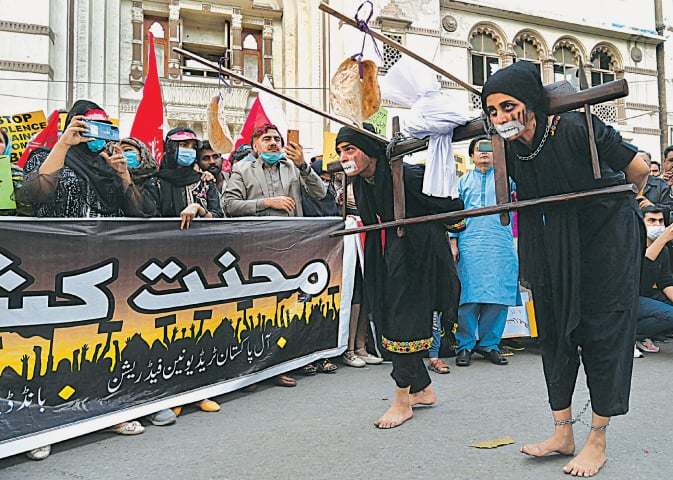
Activists stage a performance in Lahore on International Women’s Day | Arif Ali/White Star
However, we did not learn any lesson from the Ali Enterprises factory fire incident and no serious steps to ensure safety of workplaces were taken, resulting in yet another factory fire in Korangi [on August 27, 2021]. The relevant government departments remained indifferent towards safety at workplaces. Resultantly, accidents at workplaces have risen sharply.
In Bangladesh, after the incident of the Rana Plaza fire, their government, labour organisations, factory owners and international brands struck a Bangladesh Accord and, with its strict implementation, not only were factories and workplaces made safer for workers, but the labourers found opportunities to get organised and get their due rights. Moreover, the number of industrial accidents also decreased.
Similarly, in Germany, after consultation of many years, a law was passed that if a German company were found involved in any illegal act anywhere in the world, legal action would be taken against it in Germany. The European Parliament is also considering enacting a similar law.
However, rather than improving industrial safety in Pakistan, the ban on factory inspections imposed by Zia’s martial law is still persisting, though, as per the Factory Act, annual health and safety inspections of every factory is mandatory. The system of factory inspections was put on the back burner and, as a result, deadly industrial accidents are on the rise.
It is sad that the Punjab government has announced to end this open violation of the International Labour Organisation (ILO) convention. The Sindh Health and Safety Act was passed in 2016, but it lacks implementation — it is said that even a single meeting of the council constituted under this law is yet to be convened.
It is a common perception that local industrialists, their international buyers, the government and its labour-related departments are not ready to give rights to the workers as per the Constitution and labour laws of Pakistan. One of the main consequences is that the ratio of labour unions in Pakistan is less than one percent, whereas only four to five percent of the workers are getting social security benefits.
WORKERS’ RIGHTS
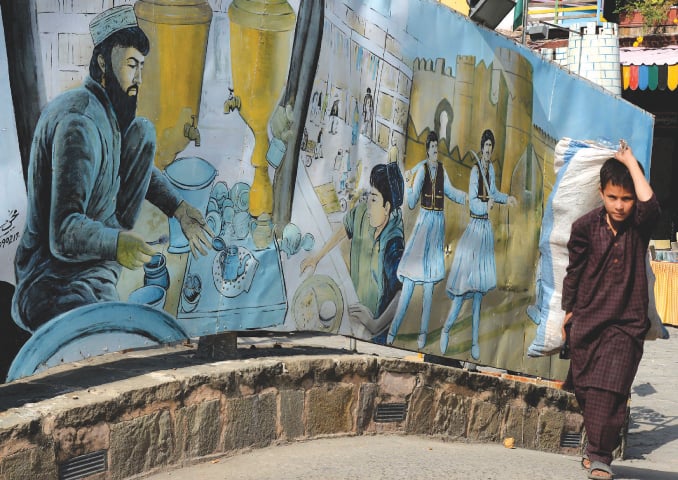
A young boy carrying goods passes by a mural in Islamabad | Mohammad Asim/White Star
Factories are also required to provide clean drinking water and an adequate number of toilets to the workers. However, clean drinking water and safe and hygienic toilets are a rarity.
Pakistan’s labour laws require that “no adult worker shall be allowed or required to work in a factory for more than 48 hours in a week; if the factory is seasonal, 50 hours, and if the work is of continuous nature, he may work for 56 hours in a week.” Work hours are limited to nine a day (10 hours in the case of seasonal work).
The law permits children between the ages of 14 to 18 to work, but only for five hours a day. The law makes provisions for one weekly holiday and, if that is not given, a compensatory holiday as soon as possible. These federal regulations apply to factories in the Sindh and Punjab regions, and remain mostly substantively unchanged by their respective provincial labour laws, including the Sindh Factories Act, 2015.
Instead of enforcing and monitoring rights, provincial labour departments have proved to be slack, indolent and complacent in responding to complaints of violations and industrial disputes.
Still, it is a common complaint that workers in the garment industry routinely work beyond the stipulated nine hours a day. Factory owners are required to pay overtime for the extra hours. And, given the low levels of minimum wage and the fact that many factories do not pay even the stipulated minimum wage, many workers are left with no choice but to work overtime.
Every factory in the country is required to register its workers with the provincial social security institution and the Employees Old-Age Benefits Institution (EOBI). Factories must provide all their workers — irrespective of how they are classified — with social security and EOBI cards. However, not many workers are registered with either. Some factories use “contract workers” to bypass government regulations on mandatory minimum wage and benefits, including health and pension.
Workers who are employed at a “per piece” or target-based arrangements are even more vulnerable, and salaries are routinely deducted for failing to achieve unrealistic targets. Given that the per-piece rate is extremely low, in addition to achieving the production target, many workers are compelled to work long hours merely to make a liveable salary, in most cases below the statutory minimum wage.
The ILO Convention No 158 on Termination of Employment, together with Recommendation No 166, governs the use of short-term contracts. Pakistan has not ratified this convention, but it provides useful guidance in the following terms:
States should create “adequate safeguards” to ensure that contracts for specified periods are not used to avoid worker protection against unfair termination. Fixed-term contracts should be limited to situations where the “nature of work”, the “circumstances under which it is to be effected”, or “the interests of the worker” require them. Where short-term contracts are renewed one or more times, or when they are not limited to the situations described above, states should deem them as contracts of indeterminate duration.
In order to avoid their labour rights and safety obligations, owners often resort to outsourcing labour hiring, the workers repeatedly hired through labour contractors have a lower likelihood of redress and are at a greater risk of arbitrary dismissals. Through this device, factories avoid their mandatory obligations to pay medical benefits, pension, social security, paid leave, sick leave or holidays.
And, in the absence of written contracts and registration, workers seldom complain when factory managers exploit or ill-treat them, for fear of losing their jobs. Many factory owners are able to avoid paying statutory minimum wage by employing workers through a third-party contractor.
WOMEN IN THE WORKPLACE
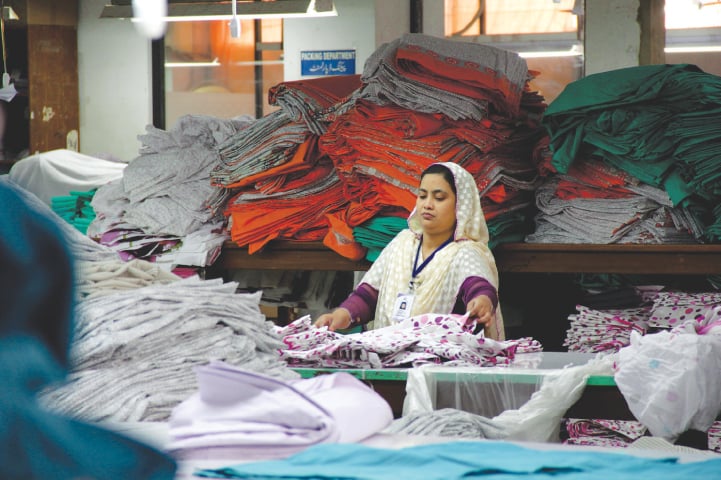
A file photo shows a woman working at a garment factory in Karachi | Hussain Afzal/White Star
Women workers are exceptionally disempowered and discriminated against in the garment industry in Pakistan. Many women are employed as contract, on piece-rate, as non-unionised workers in low-paid and low-skilled roles. According to the World Economic Forum’s Global Gender Gap Report 2016, Pakistan ranks 143rd out of 144 countries in the gender inequality index, only above Yemen.
In recent years, Pakistan has enacted a number of provincial laws guaranteeing protection against workplace harassment. Sindh province passed an anti-harassment law in 2010 and Punjab province in 2012. However, women’s rights activists have criticised the poor implementation of these laws. Most workers remain unaware of these legal protections and mechanisms of redress in cases of harassment. And poor infrastructure also exacerbates problems for women.
For example, labour laws require employers to provide for separate toilets for women. However, female workers quite often complain about not having separate bathrooms for men and women, exposing them to the risk of sexual harassment.
Our law also provides women workers employed in any factory, industrial or commercial establishment the right to three-month paid leave during pregnancy and childbirth. The woman is entitled to maternity benefit if she has worked “for a period of not less than four months immediately preceding the day on which she is delivered of a child” (West Pakistan Maternity Benefits Ordinance, 1958 — a Punjab provincial law).
Employers are obligated, by law, to establish day-care centres. And Pakistani labour law requires that anyone employing more than 50 women should provide a separate room for children under the age of six. This provision is extensively violated with impunity.
Forced overtime poses specific additional challenges for women. Because household labour and caregiving work is gendered in Pakistan, women workers often juggle employment with primary caregiving and housekeeping responsibilities at home. Labour laws exempt women from being compelled to work in factories before 6am and after 7pm — unless it is with their consent and the employer provides transportation, in which case work till 10pm is permissible.
Women workers who are forced to work overtime in the evenings also have difficulties traveling back home due to security concerns and a lack of transport. However, in most cases, factories are not only forcing women to do overtime against their wishes, but also do not organise transportation, as required under the law.
In some cases, factories use home-based workers for special orders or on a seasonal basis. Women engaged in home-based work are not formally recognised as workers and hence are often denied the protections offered by the labour laws. They are not able to join factory unions or unionise, and their work remains unregulated.
Pakistan’s economic statistics do not have any classification for home-based workers. According to a 2014 estimate, in Pakistan, almost 80 percent of the total labour force is engaged in the informal economy, and more than 50 percent of this consists of women. Approximately 77 to 83 percent of the women in the informal economy are home-based workers.
Pakistan’s minimum-wage laws have also not been amended to adequately cover home-based workers. In February 2018, Sindh province passed the country’s first tripartite labour policy, which extended labour law protections to home-based workers. An ILO survey in Karachi in 2016 found that the average hourly wage rate across all work types is 41 rupees (39 US cents), which is about 60 percent of the current statutory minimum wage (67.50 rupees an hour). However, home-based workers are paid even less. For cropping, the most common task distributed to them, home-based workers are typically paid a quarter of the minimum wage rate.
PROTECTING OUR CHILDREN

A boy sells sherbet from a pushcart in Islamabad | Mohammad Asim/White Star
Children in Pakistan continue to engage in child labour, including the worst forms of child labour and bonded labour, in different sectors such as brick kilns and agriculture. It is the increasing cost of living that forces children to work rather than attend school. Factories sometimes employ children to avoid paying minimum wage and overtime. Long working hours without adequate breaks, coupled with unhygienic conditions, can disproportionately affect the health of child workers, sometimes resulting in serious illnesses.
Pakistan has ratified the Convention on the Rights of the Child (CRC), which states that children have a right “to be protected from economic exploitation and from performing any work that is likely to be hazardous or to interfere with the child’s education, or to be harmful to the child’s health or physical, mental, spiritual, moral or social development.” Pakistan has also ratified relevant ILO conventions, including Convention No 182, concerning the Worst Forms of Child Labour, and Convention No 138, concerning Minimum Age for Admission to Employment.
In compliance with these conventions, Pakistan has set a minimum age for admission to work at as low as 14 and has other rules governing work by children. However, because of poor labour inspections and enforcement, Pakistani child labour provisions are frequently violated.
Instead of enforcing and monitoring rights, provincial labour departments have proved to be slack, indolent and complacent in responding to complaints of violations and industrial disputes. The labour department, quite often, thus refuses to entertain complaints by individual workers, requiring that they be made by the workers’ union. Given that effective unionisation in private sector factories is less “than one percent”, according to some reports, this requirement largely makes redress from the labour departments inaccessible.
THE WEAKENING OF LABOUR DEPARTMENTS
A series of government policies and regulations since 2003 have made the provincial labour departments weaker and factory managements largely unaccountable.
The policy for labour inspections changed in 2003 after a military coup by Gen Pervez Musharraf. Previously, factories were inspected once a year, without prior notice. The policy was amended to require the labour department to issue a month’s notice to factory management, mentioning the exact date of the inspection.
Punjab, the country’s largest province, banned labour inspections through the Punjab Industrial Policy in 2003, with the objective of “developing an industry and business-friendly environment to attract fresh investment.”
The ban on labour inspections was removed in 2012 following several industrial disasters in the province. The 2003 Punjab ban on labour inspections was followed by a similar ban in Sindh. Provincial labour departments are severely underfunded and understaffed. According to an ILO study in 2016, the labour standards and inspections systems “are very weak, underfunded, lacking in modern training, and lacking in capacity to conduct effective training.”
The ILO reported in 2012 that there were only 337 inspectors in the country, around one for every 250,000 workers. In 2017, according to one report, there were 547 labour inspectors in Pakistan for over 350,000 factories in the country. There were only 17 women labour inspectors. The provincial labour department inspector often does not have the capacity or training to conduct thorough inspections and ensure enforcement of workers’ rights.
WORKING FOR THE COMMON MAN
A worker’s right to organise is well-established under international human rights law, and explicitly guaranteed in the ICCPR (International Covenant on Civil and Political Rights) and the ICESCR (International Covenant on Economic, Social and Cultural Rights), as well as two of the core ILO conventions: ILO Convention No 87, concerning the Freedom of Association and Protection of the Right to Organise, and ILO Convention No 98, concerning the Right to Organise and Collective Bargaining — both of which Pakistan has ratified.
These conventions obligate the Pakistan government to ensure that employers do not thwart workers’ right to union formation and participation. The ICCPR provides that “everyone shall have the right to freedom of association with others.”
As a member of the ILO, Pakistan has an obligation “to respect, to promote and to realise, in good faith and in accordance with the Constitution, the principles of the fundamental rights which are the subject of Conventions.” The ILO Committee on Freedom of Association has noted that ILO members, by virtue of their membership, are “bound to respect a certain number of general rules which have been established for the common good. Among these principles, freedom of association has become a customary rule above the Conventions.
Under ILO Convention No 87, “Workers … without distinction whatsoever, shall have the right to establish and … to join organisations of their own choosing without previous authorisation” and “to elect their representatives in full freedom.” Authorities should refrain from any interference that would restrict this right or impede its enjoyment. States are free to prescribe legal formalities for establishing unions, but they cannot abuse this freedom by prescribing formalities that impair fundamental labour rights guarantees.
Our workers are suffering the worst kind of exploitation. Woes of our common man are multiplying every day. Rights of our workers are being trampled with impunity. There is not much regard left for the life, honour and dignity of the underprivileged. Unfortunately, a large part of our society has shown complete apathy and indifference towards the plight of the less privileged and disadvantaged segment of our society.
We, the judiciary, also needs to fully morph into a people-sensitive judiciary, and as a more compassionate organ of the state. We should, therefore, endeavour towards evolving a framework and mechanism for speedy and effective redressal of the common man’s complaint of exploitation and deprivation.

